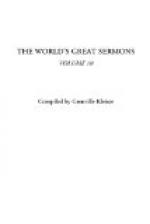After contrasting love with these things, Paul, in three verses, very short, gives us an amazing analysis of what this supreme thing is. I ask you to look at it. It is a compound thing, he tells us. It is like light. As you have seen a man of science take a beam of light and pass it through a crystal prism, as you have seen it come out on the other side of the prism broken up into its component colors—red, and blue, and yellow, and violet, and orange, and all the colors of the rainbow—so Paul passes this thing, love, through the magnificent prism of his inspired intellect, and it comes out on the other side broken up into its elements. And in these few words we have what one might call the spectrum of love, the analysis of love. Will you observe what its elements are? Will you notice that they have common names; that they are virtues which we hear about every day, that they are things which can be practised by every man in every place in life; and how, by a multitude of small things and ordinary virtues, the supreme thing, the summum bonum, is made up?
The spectrum of love has nine ingredients:
Patience—“Love suffereth
long.”
Kindness—“And is kind.”
Generosity—“Love envieth
not.”
Humility—“Love vaunteth
not itself, is not puffed up.”
Courtesy—“Doth not behave
itself unseemly.”
Unselfishness—“Seeketh
not her own.”
Good temper—“Is not easily
provoked.”
Guilelessness—“Thinketh
no evil.”
Sincerity—“Rejoiceth
not in iniquity, but rejoiceth in the truth.”
Patience, kindness, generosity, humility, courtesy, unselfishness, good temper, guilelessness, sincerity—these make up the supreme gift, the stature of the perfect man. You will observe that all are in relation to men, in relation to life, in relation to the known to-day and the near to-morrow, and not to the unknown eternity. We hear much of love to God; Christ spoke much of love to man. We make a great deal of peace with heaven; Christ made much of peace on earth. Religion is not a strange or added thing, but the inspiration of the secular life, the breathing of an eternal spirit through this temporal world. The supreme thing, in short, is not a thing at all, but the giving of a further finish to the multitudinous words and acts which make up the sum of every common day.
There is no time to do more than to make a passing note upon each of these ingredients. Love is patience. This is the normal attitude of love; love passive, love waiting to begin; not in a hurry; calm; ready to do its work when the summons comes, but meantime wearing the ornament of a meek and quiet spirit. Love suffers long; beareth all things; believeth all things; hopeth all things. For love understands, and therefore waits.
Kindness. Love active. Have you ever noticed how much of Christ’s life was spent in doing kind things—in merely doing kind things? Run over it with that in view, and you will find that He spent a great proportion of His time simply in making people happy, in doing good turns to people. There is only one thing greater than happiness in the world, and that is holiness; and it is not in our keeping; but what God has put in our power is the happiness of those about us, and that is largely to be secured by our being kind to them.




